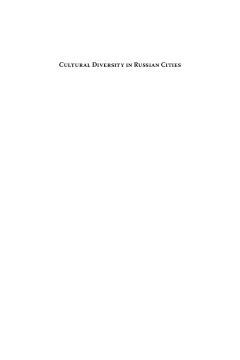
Additional Information
Book Details
Abstract
Cultural diversity — the multitude of different lifestyles that are not necessarily based on ethnic culture — is a catchphrase increasingly used in place of multiculturalism and in conjunction with globalization. Even though it is often used as a slogan it does capture a widespread phenomenon that cities must contend with in dealing with their increasingly diverse populations. The contributors examine how Russian cities are responding and through case studies from Moscow, St. Petersburg, Novosibirsk, and Sochi explore the ways in which different cultures are inscribed into urban spaces, when and where they are present in public space, and where and how they carve out their private spaces. Through its unique exploration of the Russian example, this volume addresses the implications of the fragmented urban landscape on cultural practices and discourses, ethnicity, lifestyles and subcultures, and economic practices, and in doing so provides important insights applicable to a global context.
Cordula Gdaniec currently works at the German-Russian Museum Berlin-Karlshorst in a project on cultures of remembrance. From 2003-2008, she was a Research Fellow and Lecturer at Humboldt University in Berlin, involved in the project "Urban culture and ethnic representation Berlin and Moscow as emerging world cities?" at the Department of European Ethnology.
“Taken together, these [contributions] reveal that cosmopolitanism’s definitions and meanings only exist in the plural, that the formation of cosmopolitan ideas and communities is inevitably contingent and place-specific, and that the forces preaching exclusion and intolerance are often at least as powerful as those promoting cultural acceptance in a rapidly globalising world. I recommend it for the insights and case studies it offers, and it would be a useful text for courses concerned with globalisation and urbanism.” · Urban Studies
“The volume is a well-integrated collection of chapters, which explore new perspectives on urban life in post-Soviet Russian cities, addressing the themes of multiculturalism, socio-spatial divisions and competing claims to urban space. It will be of interest to Russian studies scholars, as well as to urban studies researchers within the disciplines of anthropology, sociology and human geography.” · Cultural Analysis
"In total, this volume provides accessible, interesting and detailed empirical studies and offers compelling insights into various aspects of urban cultural diversity as related to space and spatial practices. By focusing on Russian cities and incorporating many contributions from Russian researchers, it also adds a new perspective to our understanding of this region.” · Anthropological Notebooks
“[This] book makes it evident that space, place, and territory are factors to be taken seriously in any further exploration of the nation–building process, nationalism, the formation of national and urban identities, and the impact of globalization on cities. This theoretical insight, combined with the empirical analyses of numerous sites, processes, phenomena, and practices make [it] important and thought-provoking reading that needs to be considered not only for those focusing on Russia, but for Eastern Europe as well.” · Social and Cultural Geography
